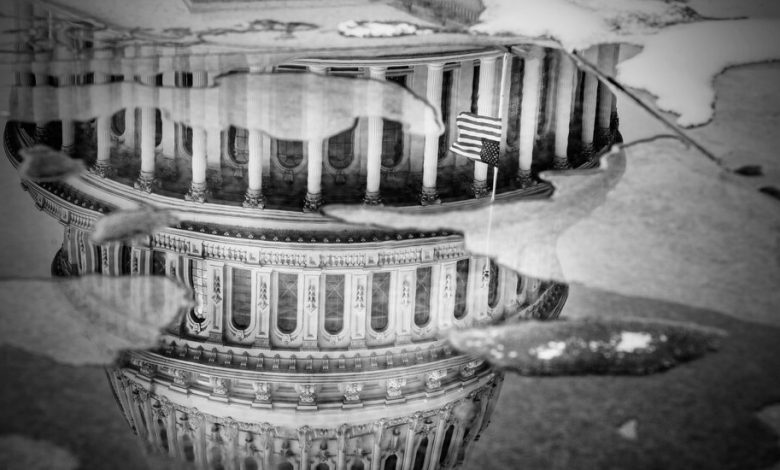Making America the Opposite of Great

I admit it: Like many liberals, I’m feeling a fair bit of MAGAfreude — taking some pleasure in the self-destruction of the American right.
There has, after all, never been a spectacle like the chaos we’ve seen in the House of Representatives this week. It had been a century since a speaker wasn’t chosen on the first ballot — and the last time that happened, there was an actual substantive dispute: Republican progressives (yes, they existed back then) demanded, and eventually received, procedural reforms that they hoped would favor their agenda.
This time, there has been no significant dispute about policy — Kevin McCarthy and his opponents agree on key policy issues like investigating Hunter Biden’s laptop and depriving the Internal Revenue Service of the resources it needs to go after wealthy tax cheats. Long after he tried to appease his opponents by surrendering his dignity, the voting went on.
But while the spectacle has been amazing and, yes, entertaining, neither I nor, I believe, many other liberals are experiencing the kind of glee Republicans would be feeling if the parties’ roles were reversed. For one thing, liberals want the U.S. government to function, which among other things means that we need a duly constituted House of Representatives, even if it’s run by people we don’t like. For another, I don’t think there are many on the U.S. left (such as it is) who define themselves the way so many on the right do: by their resentments.
And yes, I mean “resentments” rather than “grievances.” Grievances are about things you believe you deserve, and might be diminished if you get some of what you want. Resentment is about feeling that you’re being looked down on, and can only be assuaged by hurting the people you, at some level, envy.
Consider the phrase (and associated sentiment), popular on the right, “owning the libs.” In context, “owning” doesn’t mean defeating progressive policies, say by repealing the Affordable Care Act. It means, instead, humiliating liberals personally — making them look weak and foolish.
I won’t claim that liberals are immune to such sentiments. As I said, MAGAfreude is a real thing, and I’m feeling a bit of it myself. But liberals have never seemed remotely as interested in humiliating conservatives as conservatives are in humiliating liberals. And a substantial part of what has been going on in the House seems to be that some Republicans who expected to own the libs after a red wave election have acted out their disappointment by owning Kevin McCarthy instead.
And does anyone doubt that resentment on the part of those who felt disrespected was central to the rise of Donald Trump? Are there any pundits left who still believe that it was largely about “economic anxiety”?
I’m not saying that the decline of manufacturing jobs in the heartland was a myth: It really did happen, and it hurt millions of Americans. But the failure of Trump’s trade wars to deliver a manufacturing revival doesn’t seem to have turned off his base. Why?
The likely answer is that Trump’s anti-globalism, his promise to Make America Great Again, had less to do with trade balances and job creation than with a sense that snooty foreigners considered us chumps. “The world is laughing at us” was a consistent theme of Trump speeches, and his supporters surely imagined that the same was true of domestic globalist elites.
And I have a theory that Trump’s own underlying ludicrousness, his manifest lack of the intellectual capacity and emotional maturity to be president, was part of what endeared him to his base. You fancy liberals think you’re so smart? Well, we’ll show you, by electing someone you consider a clown!
The irony is that the MAGA movement has succeeded beyond the wildest dreams of sinister globalists (if any exist) in making America the opposite of great. Right now the world really is laughing at us, although it’s terrified, too. America is still the essential nation, on multiple fronts. When the world’s greatest economic and military power seemingly can’t even get a functioning government up and running, the risks are global.
I mean, even with a speaker in place, how likely is it that the people we’ve been watching the past few days will agree to raise the debt ceiling, even if failing to do so creates a huge financial crisis? And there may be many other risks requiring emergency congressional action even before we get to that point.
Of course, the world is laughing even harder at Republicans, both the ultraright refuseniks and the spineless careerists like McCarthy who helped empower the crazies. For what shall it profit a man, if he shall lose his own soul, and still not gain enough votes to become speaker of the House?
I’m not sure what we are in store for, nor is anyone else. One thing is sure, however: America is already less great than it was when Nancy Pelosi ran the House, and it’s shrinking by the day.
The Times is committed to publishing a diversity of letters to the editor. We’d like to hear what you think about this or any of our articles. Here are some tips. And here’s our email: [email protected].
Follow The New York Times Opinion section on Facebook, Twitter (@NYTopinion) and Instagram.
